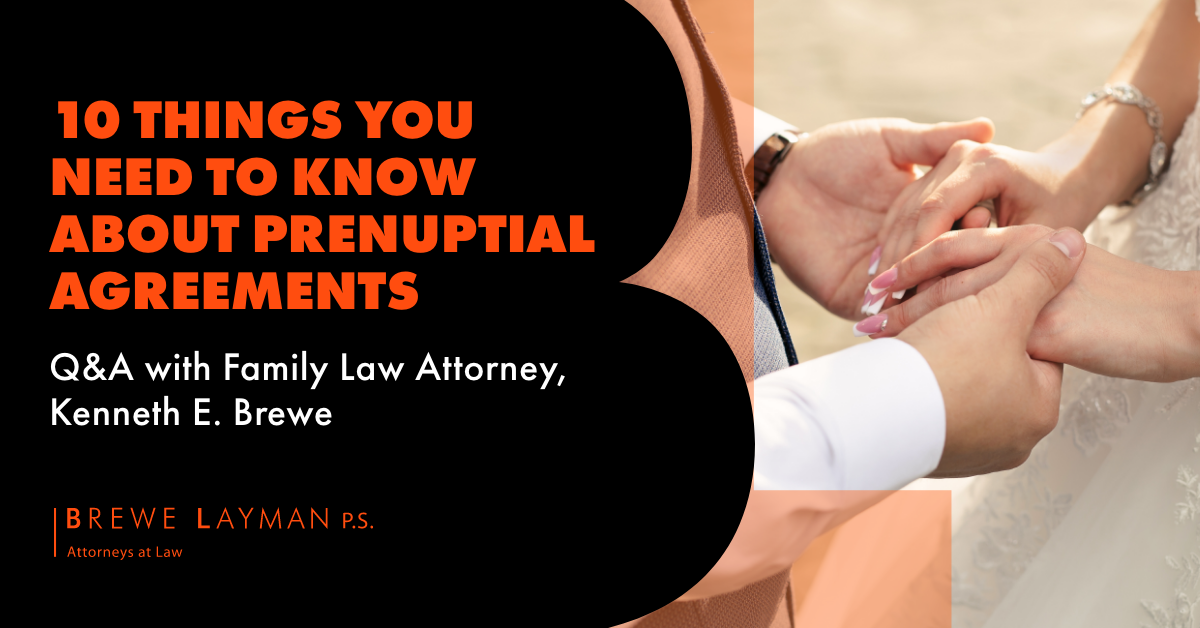10 Things You Need to Know About Prenuptial Agreements

Prenuptial and postnuptial agreements serve as valuable tools for protecting assets and ensuring clarity. It’s important for them to be drafted carefully, with the guidance of experienced attorneys, to ensure they are legally enforceable and meet the specific needs of the couple involved.
Whether you’re considering tying the knot, already married, or simply curious about how these agreements work, keep reading as we unravel the truth about prenups and postnups.

Ken Brewe, Family Law Attorney
In this exclusive interview with Ken Brewe, he shares valuable insights from his wealth of knowledge in this field. From explaining the purpose of prenuptial agreements and their enforceability in Washington State to shedding light on potential challenges and intricacies, Ken provides invaluable guidance on prenuptial and postnuptial agreements.
1. What is a Prenuptial Agreement?
KB: A prenuptial agreement is a written contract entered into by and between prospective spouses prior to their marriage. A post-nuptial agreement is a written contract entered into by and between spouses following their marriage. The purpose of a prenuptial/postnuptial agreement is to address and secure the parties’ property and other rights in the event of divorce or the death of a party during the marriage.
2. Are prenuptial and postnuptial agreements valid and enforceable in Washington State?
KB: Yes. If properly prepared and executed. Both parties will need their own attorneys. Generally, legal counsel for one of the parties will prepare the agreement, and legal counsel for the other will review it carefully with their client. Both attorneys will, typically, execute a certification verifying they have carefully discussed or reviewed the agreement with their client. Dual representation (where one attorney represents both parties) or the failure of both parties to obtain counsel is almost always a reason to invalidate the agreement.
In addition to both parties having legal counsel, it is imperative that the agreement incorporate a comprehensive summary of each parties’ estate with fair-market valuation representations.
3. How do courts determine whether a prenuptial or postnuptial agreement is valid or enforceable?
KB: In basic terms, the court first determines if the agreement is substantively fair to the party not seeking enforcement. If the court determines the agreement is not fair, the court focuses on whether procedural fairness accompanied the process. In other words, even if the court finds the agreement to be substantively unfair, the prenuptial or postnuptial agreement can still be enforced if procedural fairness in the negotiation or execution process is determined to have occurred.
4. Can you prepare a prenuptial agreement yourself, i.e., without the involvement of legal counsel?
KB: You can, but it is very likely that it will not be enforced. Experienced legal counsel is an important part of the process of negotiating and finalizing a prenuptial or postnuptial agreement.
5. Can you negotiate or address parenting plans or child custody issues as an element of the prenuptial agreement?
KB: No. Such issues are reserved for review or approval by a court, who will focus on the best interests of the child(ren) and not what the parties may have agreed to in their agreement.
6. Is a Waiver of Spousal Maintenance or Alimony Clause in a Prenuptial or Postnuptial Agreement Enforceable?
KB: Perhaps. The Washington courts have yet to resolve this issue. Some states have taken the position that such waiver clauses are contrary to public policy and, hence, unenforceable. Other states permit and enforce such waiver clauses.
7. When do you sign a prenuptial agreement?
KB: We suggest clients engage counsel well in advance of their wedding date such that all negotiations and review of draft versions of the agreement are completed so that the agreement can be signed by both parties and counsel at least 30 days prior to the wedding date.
8. Why might a prenuptial agreement not be enforced by the court?
KB: There are several reasons why a prenuptial agreement may not be enforceable, including:
- It may not be enforceable if you do not live in Washington State when litigation regarding the premarital agreement ensues.
- A waiver of spousal support (alimony or maintenance) clause may not be enforceable because it may be deemed unconscionable by Washington State courts.
- It may not be enforceable if Washington state law changes.
- It may not be enforceable if you do not keep your separate property identifiably separate.
- It may not be enforceable if you enter into conflicting agreements in other states or countries.
- It may not be enforceable if you lose or do not keep a copy of the agreement.
- It may not be enforceable if your spouse to be establishes that s/he was forced under duress into signing the agreement or that s/he did not know what s/he was doing when s/he signed it, i.e., s/he was not mutually competent to review and understand the agreement.
- It may not be enforceable if your spouse to be claims (and proves) s/he was not represented by an independent attorney.
- It may not be enforceable if you did not provide your spouse-to-be with a full and complete disclosure of your assets and obligations as part of the process.
- It may not be enforceable if you do not comply with your obligations as detailed in the agreement.
9. Who bears the burden of establishing the validity and enforceability of a signed prenuptial or postnuptial agreement?
KB: The party seeking to enforce it.
10. Does Brewe Layman, P.S., draft and review prenuptial and postnuptial agreements?
KB: Yes. We do. Kenneth Brewe has drafted and reviewed such agreements for over 35 years. He regularly speaks on the topic of prenuptial agreements at continuing legal education courses for attorneys and is the author of several publications (Washington Practice/WSBA Deskbook for Attorneys) regularly utilized by attorneys on the topic.
– – –
QUESTIONS?
Brewe Layman is working diligently, adeptly and tenaciously with new and existing clients to ensure you’re supported throughout the course of your case or matter. We take pride in bringing you experienced and ethical legal representation in a manner that feels surprisingly approachable. If you have any questions or are interested in scheduling an appointment, please use the form below:
Related Links: Family Law / Divorce | Divorce Guides
